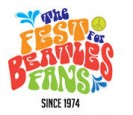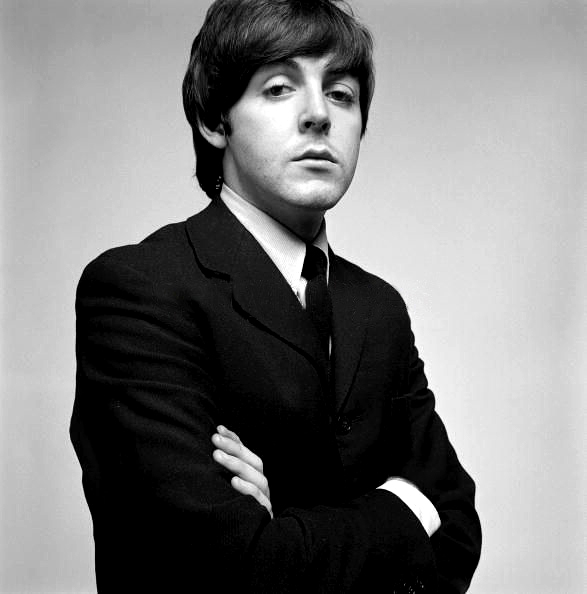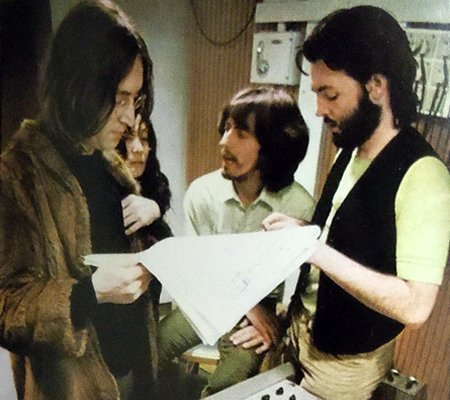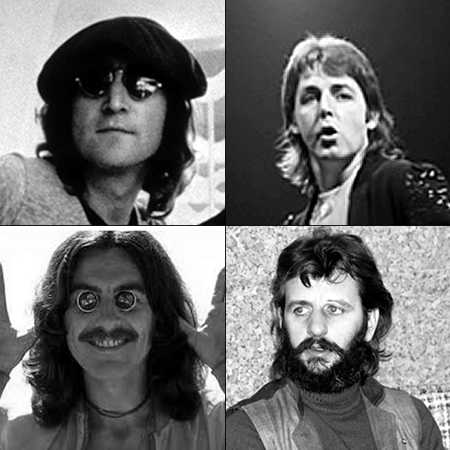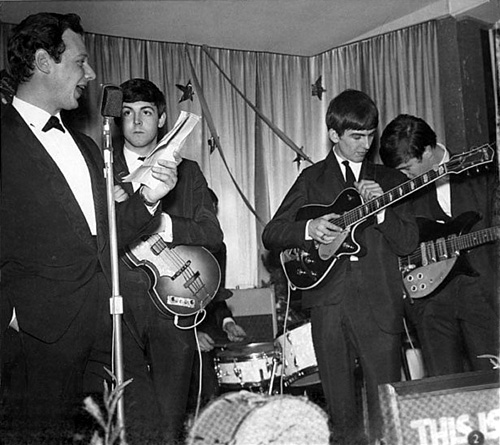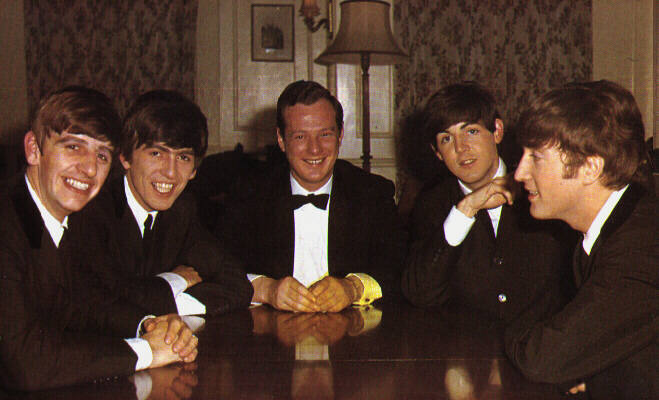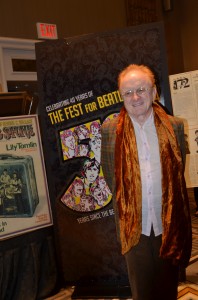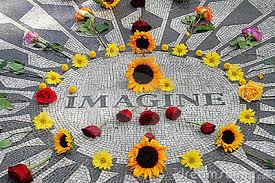Throughout his career, Paul McCartney has shown himself to be a bit of a chameleon, with his musical style bouncing all over the place from the mid-60s to the present.
While with the Beatles, you can point to the absurd differences between a song like ‘Helter Skelter’ and ‘Honey Pie,’ both of which appear on The Beatles (The White Album).
During his solo career, McCartney has gone from light to heavy to experimental (‘Temporary Secretary,’ etc) to classical and circled all the way back to his roots while putting a ‘NEW’ spin on things.
One of the best early examples of McCartney’s versatility can be found on three songs he recorded during the ‘Help’ sessions.
‘I’m Down,’ ‘I’ve Just Seen A Face,’ and ‘Yesterday’ were all recorded on the same day in June of 1965.
‘I’m Down’ is a classic McCartney rocker, which the Beatles began using to wrap up most of their live shows.
‘I’ve Just Seen A Face’ is a bluesy/country/folk-pop song that features a tempo unlike anything the group had done prior.
‘Yesterday,’ now viewed as an absolute classic, featured two contrasting sections and a string quartet.
Below, listen to alternate/live versions of each song >>
Author: Danny
The Beatles pondered doing a live (non-rooftop) show in 1969
On January 29, 1969, the day before their rooftop concert, Paul McCartney and John Lennon had an at times intense conversation during the ‘Get Back’ sessions.
Over on the amoralto tumblr page, they did a great job breaking down the conversation.
The conversation – mostly dominated by Paul – revolved partially around the idea that the Beatles could do something instead of the rooftop concert.
Paul suggested playing in front of audiences again, entering a ‘visual’ studio, or doing some other not-yet-hashed-out thing instead of and/or in addition to the rooftop concert.
In the excerpt below, Paul makes his case:
PAUL: Yeah, but so… Hmm. But I’m just talking about this thing, like this thing we’ve entered upon now, we still haven’t got any aim for it, except another album, again. Our only aim, ever, is an album. Which is like a very non-visual thing, it’s very sort of… But it’s great, isn’t it, and we do albums, then. But—
JOHN: But albums is what we’re doing, at the moment.
PAUL: [uneasy] Yeah, but I don’t know. Like—
JOHN: I mean, that’s what we [inaudible] talk about.
PAUL: —like I was saying the other day, is that you – is that you – you— [hesitating] We’re into albums as the four of us, but I really think we could be into other things. But every time I talk about it, I really sound like I’m the showbiz correspondent, trying to hustle us to do a Judy Garland comeback, you know. But really, all I mean is – well, look, let’s get – let’s change, or let’s go into a studio, like a vision studio, after we’ve learnt all of these, that’s just as good as this for sound, that’s got the same sort of thinking…
Later on in the discussion, Paul intimates that George would be in favor of a show in the mold of the ones Bob Dylan and Elvis Presley were having around that time, and John wouldn’t rule it out:
PAUL: There’s no other way. We can’t think ourselves out of it. And we can’t sort of say, well, it will be alright. See, and then the only other alternative to that is to say, well, we don’t – we will never do it to an audience again. But if we intend to – to keep any sort of contact on that scene… [pause] Yeah. I do understand George’s just saying, “There’s no point,” you know, because it is like we’re Stravinsky, and it’s in the music. And he doesn’t sort of get up and play his ‘Joanna’ for them anymore. He just writes it, and just sort of maybe occasionally conducts it.
JOHN: But as long as there’s a good reason – like George wants to do a heavy show, like Dylan and Presley, all that.
PAUL: Mm.
JOHN: And that’ll be a large – I don’t know, like, I mean, that – that’s all this.
PAUL: Mm, yeah, I know, yeah. that’s always – that’s always just—
JOHN: Okay, yeah.
PAUL: That’s us again, you know.
JOHN: Yes, I know.
PAUL: It’s us going silly again.
JOHN: It is, and I think – I think we might do it.
All Beatles fans know what happened next.
The group went on to the Apple rooftop the next day for their final public performance.
A few weeks later, the group began work on ‘Abbey Road,’ the final album they would record.
What would have happened if Paul had convinced John and George to tour again…or if he had just convinced them to do one ‘audience show.’
Chances are that with George being held back musically, John wanting to branch off, and Paul’s at times overbearing personality, the group still would’ve disbanded.
However, it certainly would’ve been interesting to see what the dynamic would’ve been if the band had toured or played even one legitimate concert instead of the rooftop gig.
In their own words: were The Beatles ever ready to reunite?
Paul McCartney recently gave an interview where he addressed why The Beatles never reunited after the band broke up in 1970. Here’s what Paul had to say:
We’ve been through all the sort of joys and the horrors of being in a band. We’ve done everything we’ve wanted to do and if we now sort of get back together again, it could fall flat. We might not enjoy it, so why do it? As we say in England, ‘Leave ‘em laughing.’
For the legacy of the group, perhaps it’s best that they remained apart. However, it’s tantalizing to think of what the group may have been able to do if they had gotten back together at any point between their breakup and John Lennon’s death in 1980.
While Paul recently spoke about what was going through the heads of the broken up Beatles , John, Paul, and George in particular all addressed reunion questions in the years following the breakup…
John Lennon in 1975 –
It’s strange, because at one period when they’re asking me, I say ‘no, never, what the hell? Go back? Not me. And then it came to a period when I thought, ‘well, why not?’…everyone always envisions the stage show. To me, if we worked together (it would be) the studio again…when I’m saying that, I turn the paper and George is saying ‘not me.’ It’s never got to a position where each one of us has wanted to do it at the same time…the other question is ‘would it be worth it?’ That would be answered by if we wanted to do it. If we wanted to do it, then it’d be worth it.
We’re all leading our own lives. It’s been eight years, really, and I don’t think an ad in the paper is going to do the trick. We have to want it, personally, ourselves. And not just to make $50 million dollars or whatever the figure may be. We must do it because we want to be together as people first, and secondly, to be together for the music – and then everything else would fall into place. But at the moment everybody is doing their own lives, and it feels to me a bit like saying ‘please go back to school.’ You know, that (the first stint as Beatles) was like our apprenticeship.
Paul McCartney in July of 1980 –
For a long time now, the Beatles have been split up and – just the way things are – certain ones of us like playing together and stuff, but I don’t think John would ever be interested in kind of getting the group back together again. And the four of us individually wouldn’t be really interested in doing it, just because it’s – you can’t reheat a soufflé, as someone once said. Three of us got up at Eric Clapton’s wedding, with Eric and Ginger Baker and a bunch of loonies, but we’ve never played the four of us together since we’ve split up…I definitely know it’s not on…it’s not anything that would ever happen.
After John Lennon’s death, any potential reunion sadly became impossible.
Last year, Ringo Starr weighed in on whether or not the group would’ve gotten back together if John hadn’t been taken so violently in 1980 –
Don’t know. It’s a crazy question. But…I’d like to think, yes, we would. Paul still goes out with his band, I go out with mine and John would probably have been going out with his. George was not big on touring so I’m not sure about him. But who knows… it could have come together.
Of the four Beatles, it seems that John – at least in the interview he gave in 1975 – was the one who was most interested in a reunion. While listening to John speak, there are reservations, but he seems genuinely excited about the possibility.
George was a bit more cagey than John, but after listening to him speak, it felt as if he would’ve been open to the band getting back together as long as he felt the time was right.
Interestingly, it’s Paul – who seemed to be attached to the group the most while together – who was close to dismissive about there ever being a reunion. Perhaps Paul was letting his then-cold relationship with John get in the way of his true feelings. Perhaps he wasn’t.
Listening to John and George speak about a potential reunion, and reading about how Ringo felt, it seems that if John had lived and he and Paul had gotten over their differences, a reunion ultimately would’ve happened.
The Curtain Rising: Brian Epstein’s Induction into the Rock & Roll Hall of Fame
Ignore the above – this amazing piece is…
by Vivek J. Tiwary, author of ‘The Fifth Beatle: The Brian Epstein Story’
April 11, 2014
“Best of all and far beyond anything money can buy, I love to lean on my elbows at the back of the stalls and watch the curtain rise on my artistes.” – Brian Epstein, 1964.
Yesterday afternoon, hours before he would induct Beatles’ manager Brian Epstein into the Rock and Roll Hall of Fame, my friend Peter Asher warned me that his induction speech would be short by necessity. I suspect Peter thought I’d be disappointed that Brian might not get his full due. And yet last night, Peter gave the most lovely, heartfelt, personal, poignant, and informative speech about Brian Epstein that the mainstream public has heard in years, perhaps since Paul McCartney told the BBC “If anyone was ‘The Fifth Beatle’ it was Brian” (and that was in 1999).
Speaking of Paul McCartney, let’s get this out of the way: There has been sentiment amongst Beatles’ fans ranging from confusion to complaint about McCartney’s not inducting Brian himself. Well, when Brian died his mother respectfully asked the Beatles not to join the funeral proceedings for fear that the event would become a media circus, focused on the Beatles when the moment should belong to Brian and the people who loved him. The same could be said of last night’s induction ceremony. With no disrespect to the fab Sir Paul, his presence wasn’t missed. Peter took the ball and knocked it from Shea Stadium to Candlestick Park.
Acknowledging Brian’s brilliant vision in being the first to believe in the Beatles, Peter then focused on Brian’s passion, faith, and unwavering persistence in
convincing an entirely disbelieving music industry—and the world in its wake — that the Beatles were destined to become not just international pop stars but
inspiring cultural icons and true artists. Peter spoke specifically of Brian’s intelligence as a manager, recognizing that early exposure was sometimes far
more important than the extra dollar, his savvy packaging and presentation of the Beatles, his wrangling control over the media to insure that each Beatles’
appearance was not just an appearance but an event. He read a note from Brian’s family who couldn’t be there in person, expressing delight at the induction and only regret that Brian’s brother Clive, his mother Queenie and his father Harry were not alive to witness it– and how proud they would have been. Peter even related a personal experience, observing a fleeting moment when Brian took a step back to enjoy some satisfaction in the success of his artists. Brian rarely gave himself those moments.
And Peter often reiterated Brian’s absolute commitment to realizing the Beatles’ wildest dreams—the fact that he considered this commitment his greatest responsibility in life, never wanting to let the band down—and the fact that in the final equation, he never failed them. It’s what made Brian Epstein an excellent manager, mentor, and friend. It’s why he deserves the title Paul gave him in 1999 of “The Fifth Beatle”. And why he deserves the 2014 Rock and Roll Hall of Fame induction last night.
All that being said, Peter’s daytime warning was still well heeded in experiencing the nighttime event. Brian’s induction was indeed brief and came at the very beginning of the ceremony. If you showed up a little late, you might have missed it. If you decided to get a drink before the big rock show, you might have missed
it. If your eyes were a bit dry that day and you blinked a little too long, you might have missed it. And that’s exactly how Brian would have wanted it. He would
have wanted to have been acknowledged and briefly celebrated, but not doted upon. And then he would have wanted to get the hell out of the way, to keep the focus on the artists who create the music.
That’s another quality of a great artist manager… and also illuminates why managers are usually the unsung heroes in their artists’ career histories. Indeed, it’s a credit to the Rock and Roll Hall of Fame that they are now inducting artist managers. And it’s another music industry boundary that Brian Epstein has shattered, paving the way for others to follow in his wake.
(Last night’s second manager inductee, following fast on Brian’s heels, was his dear friend and ally Rolling Stones manger Andrew Loog Oldham).
And then the evening moved on, and was indeed all about the artists. For the next 5 hours, we were treated to a series of glorious music highlights. For me, these included Peter Gabriel’s gentlemanly acceptance and timeless performance, Tom Morello’s outrageously awesome KISS induction speech (and Paul Stanley’s back-atcha); Stevie Nicks having the time of her life giving a powerful vocal tribute to Linda Ronstadt; Yusuf Islam’s performance reminding me what a truly amazing artist Cat Stevens is (now that I’m a father, “Father and Son” blindsided me with unexpected joy and sadness); Bruuuuuce and the E Street Band schooling me on what it really means to be a band of brothers; Daryl Hall and John Oates clearly preferring to rock than talk (and throwing mad props to my second home Philly); Dave Grohl starting by gracefully thanking the many excellent Nirvana drummers that preceded him; and my teenage crushes Joan Jett and Kim Gordon tearing the house down by channeling Kurt Cobain for performances with Nirvana.
All eyes in the house were firmly glued to that stage… Except mine, which would frequently wander towards the back of the concert hall… Where swear I saw him for one fleeting moment—leaning on his elbows, a small smile creeping across his face, watching the curtain rise on the many artists inspired by the Beatles legacy he created and protected.
But then I blinked, and he was gone.
It’s just as well—Brian Epstein would have preferred me to face the music.
Congratulations to The Fifth Beatle Brian Epstein, on his well-deserved 2014 induction into the Rock and Roll Hall of Fame.
You can visit Vivek J. Tiwary’s site – The Fifth Beatle – here >> www.thefifthbeatle.com
CLICK HERE to read Peter Asher’s induction speech.
Peter Asher to induct Brian Epstein into Rock and Roll Hall of Fame Thursday night
His entry to the Rock and Roll Hall of Fame is long overdue, but Brian Epstein – the legendary manager of The Beatles – will finally get the recognition he deserves on Thursday night.
During a ceremony at the Barclays Center in Brooklyn, Epstein will be inducted into the Rock and Roll Hall of Fame. Doing the honors will be Peter Asher.
A titan of the music industry in his own right, Asher is looking forward to Thursday night. Some of his thoughts on Epstein:
Brian Epstein single handedly changed what it meant to be a rock and roll manager. Before Brian and the Beatles, the assumption was that a pop group’s career was destined to be short and their impact ephemeral. Just as the Beatles changed this whole notion with their brilliant music, so did Brian with his honesty, his belief, his commitment, his faith and his avoidance of the greed and short term thinking which was the norm. Before the Beatles, pop music was not supposed to be imporant – and before Brian no one treated the musicians that way either. He was charming and articulate but in the end his ability to make others believe (as he did) that the Beatles were the best band in the world stemmed from his own absolute conviction that it was true. And fifty years later it is clearer than ever that he was absolutely right! I was proud to know Brian – and when I became a manager myself I looked to his determination, loyalty and style for inspiration.
In addition to doing the honors for Brian Epstein, Asher will also be inducting former Rolling Stones manager – and past FEST guest – Andrew Loog Oldham. Asher’s thoughts:
I shall pay tribute to the achievements of these two brilliant men (both friends of mine) as best I can…Brian will be sorely missed as always and Andrew has chosen not to attend but am thrilled to have the privilege of inducting them both into this illustrious organization.
Today in Beatles History: Beatles hold Top Five Spots on the Charts
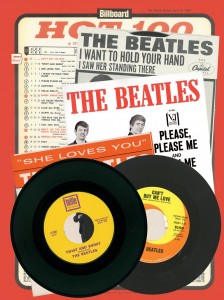
On today’s date in 1964, The Beatles made Billboard history, when their songs held the top five spots on the charts. It looked like this:
No. 1: “Can’t Buy Me Love”
No. 2: “Twist and Shout”
No. 3: “She Loves You”
No. 4: “I Want To Hold Your Hand”
No. 5: “Please Please Me”
The Beatles had seven other songs in the Top 100 that week and also had the top two Albums in the United States: Meet The Beatles and Introducing The Beatles.
As Fest founder Mark Lapidos points out:
“The Beatles had total airwave saturation in the spring of 1964, with about every other song a Beatles song on the ‘Top 40′ radio stations. For those of us baby boomers who lived through that most exciting time in music history, we will never forget it. It is life affirming to know the music is as vital today as it was 50 years ago and that new generations of fans are still discovering their magical music.”
While remembering just how remarkable the Beatles’ accomplishments were in 1964, let’s take a look at videos of some of the best live versions of the five songs that made history.
Can’t Buy Me Love:
Twist and Shout:
She Loves You:
I Want To Hold Your Hand:
Please Please Me:
Fest Memories: The 25th Anniversary Fest Kicked Off 15 Years Ago Today
25 years ago today, at the Crowne Plaza Meadowlands in Secaucus, the 25th anniversary Fest kicked off.
During the celebration of The Beatles, time was also taken out to recognize the 25 year anniversary of when Fest founder Mark Lapidos met John Lennon – setting in motion the first ever Fest in 1974.
At the ’99 Fest, guests included Gordon Waller, Laurence Juber, The Quarrymen, Doris Troy, Louise Harrison, Al Brodax, and Tony Barrow.
As a great surprise on Friday night, legendary concert promoter Sid Bernstein stopped by.
Below, Mark Lapidos – wearing the same tuxedo he wore during the first Fest in 1974, cuts the 25th anniversary cake.
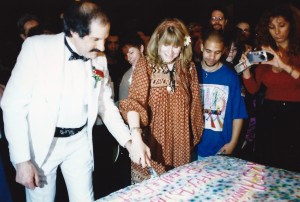
On This Date In History: John and Yoko begin the First Bed-In
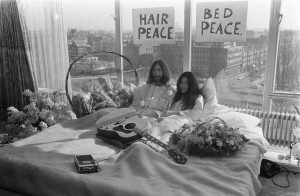
By Danny Abriano
Five days after their marriage in Gibraltar, John Lennon and Yoko Ono checked into the Amsterdam Hilton for the beginning of their first Bed-In for peace – the second Bed-In would take place in May in Montreal.
With the Vietnam war raging and Lennon and Ono aware that their non-violent public demonstration of the war would make worldwide news, Lennon and Ono stayed in bed with signs hanging over their head that read “Bed Peace” and “Hair Peace.” In order to gain attention and spread their message of world peace, they invited the media into the room each day for 12 hours.
For the most part, though, the media didn’t take the Bed-In seriously.
During the Montreal Bed-In two months later, Lennon spoke with Timothy Leary.
When asked if the message of peace was getting through, Lennon replied:
Yeah, think about it. But they’re getting it, y’know, I mean they must be. Our voices must be going out solid about every quarter of an hour. And if it isn’t singing, it’s talking, and we’re just repeating the same bit, y’know, and there’s very little “Me eyes are brown and Paul’s…y’know? I mean I do that for the ones that need it. Most of it’s just, “let’s get it together,” and it must be going out now like a mantra. We’re trying to set up a mantra, a peace mantra, and get it in their heads. It’s gonna work.
Lennon had actually wanted to hold the second Bed-In in New York, not Montreal, but he wasn’t allowed into the country due to his recent marijuana conviction.
The lasting images and videos from both Bed-Ins seem to have had far more impact than the actual Bed-Ins had at the time. However, that isn’t an indictment on Lennon or Ono. Rather, it’s a reflection of the media not taking their brilliant tactics seriously.
It’s also likely that Lennon’s political activism had a strong negative impact on the fact that the United States government began to harass him – and attempt to deport him – a few years later.
In 2012, Yoko Ono posted the Bed-In movie for all to see. It can be viewed below:
On Today’s Date in 1985: The Imagine Mosaic is Dedicated at Strawberry Fields
On today’s date in 1985, a year after Strawberry Fields opened in Central Park as a tribute to John Lennon, a dedication ceremony (with Julian Lennon, Sean Lennon, and Yoko Ono on hand) was held for the Imagine mosaic that sits prominently at Strawberry Fields.
Over the last 29 years, the Imagine mosaic has become a place for John Lennon fans to reflect and celebrate the life of the legendary Beatle.
Below, are thoughts on Strawberry Fields from Fest founder Mark Lapidos, Fest Director of Marketing Michelle Lapidos, and Fest Production Associate Danny Abriano:
Mark Lapidos:
peaceful meeting spot for my Skipping Club, my skipping fitness group. Also, it makes for fabulous photo opps.
On “Now And Then,” Which Was Nearly the Third Beatles Reunion Track
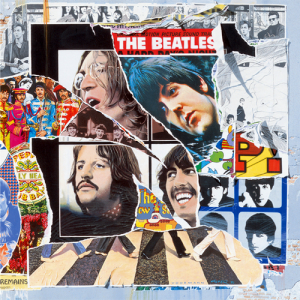
By Danny Abriano
All hardcore Beatles fans know that Paul McCartney, George Harrison, and Ringo Starr reunited in 1994 and 1995 to record “Free As A Bird” and “Real Love” for release on the upcoming Anthology 1 and Anthology 2 albums respectively.
What some may not know, is that there was another John Lennon demo the three living Beatles were planning to record for release on Anthology 3.
That demo was “Now And Then.”
Originally recorded by Lennon at the Dakota in 1979, Now And Then (along with the other Lennon demos) was given to Paul McCartney by Yoko Ono in January of 1994.
On March 20th, 1995, McCartney, Harrison, and Starr began working on Now And Then, recording a backing track that was to be used on what would’ve been the finished product. However, after one more day of working on the track, all plans to finish “Now And Then” and have it included on Anthology 3 were scrapped.
According to those who were there, there were two reasons why Paul, George, and Ringo stopped working on Now And Then.
The first, was that some of the verses and part of the chorus weren’t finished and/or were unintelligible on the demo. Paul, George, and Ringo would’ve had to finish writing those parts for John, which is something Paul later stated George “didn’t want to do.” The original lyrics by John are as follows:
I know it’s true, it’s all because of you
And if I make it through, it’s all because of you
And now and then, if we must start again
We will know for sure, that I love you
I don’t want to lose you – oh no, no, no
Lose you or abuse you – oh no, no, no, sweet darl’
But if you have to go, away
If you have to go (unintelligible)
Now and then, I miss you
Oh now and then, I (unintelligible)
I know return to me
I know it’s true, it’s all because of you
And if you go away, I know you (unintelligible)
I don’t want to lose you – oh no, no, no
Abuse you or confuse you – oh no, no, no, sweet darl’
But if you had to go
Well I won’t stop you babe
And if you had to go
Well (unintelligible)
As can be seen above, there are four spots where John Lennon’s words either trail off, are unintelligible, or both. Those are the verses the remaining Beatles would’ve had to have re-written.
The second issue with the track was that the quality of the original Lennon demo contained a technical problem – a humming noise that lingered on the tape throughout.
In a bootleg that was released in 2009, the humming noise from the original Lennon demo was removed, meaning that the song could potentially be finished by McCartney and Starr if they so choose.
In 2012, McCartney was quoted as saying he would be open to completing Now And Then with Jeff Lynne as the producer.
Perhaps the song will eventually be finished by Paul McCartney and Ringo Starr (also utilizing the backing track that includes George Harrison) and released. Until then, you can listen to John Lennon’s demo and imagine what the finished product might sound like:




